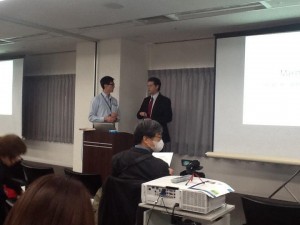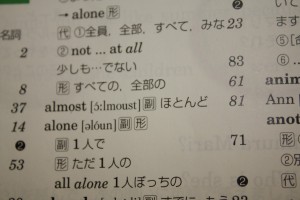extensive reading Language learning presentations self-study university
by sendaiben
6 comments
Video: Extensive Reading Workshop for University Staff (Japanese)
ER for Staff -a training workshop at Tohoku University
This 90-minute workshop on using extensive reading for self-study in English was conducted in Japanese at the Tohoku University Library on December 26th, 2013. I really don’t like listening to myself speak Japanese (it sounds very different to what I hear in my head) but I guess this is something I will get used to eventually (after all, I went through the same process watching my presentations in English and am now fairly comfortable with that).
conference curriculum elllo extensive listening extensive reading graded readers language courses Language learning materials online resources presentations self-study
by sendaiben
2 comments
Oxford Day 2013 video, slides, and writeup
I was extremely lucky to be invited to speak at the first Oxford Day in Japan this month.
I wasn’t really sure what to expect, but I really enjoyed the whole thing. 188 teachers attended, and there were nine presentations (five time slots). The venue was a very comfortable meeting space in Shibuya, and the provided coffee and sandwiches were excellent.
Most importantly for me, I had a fantastic group of teachers in my presentation who were very forgiving and asked me a bunch of questions at the end. Here is a copy of my slides in .pdf format and the video of the presentation is below:
131123 Maximising Input (slides in .pdf format)
If you have any questions please let me know in the comments, or send me an email to sendaiben@gmail.com.
high school jobhunting Language learning op-ed study abroad university
by sendaiben
7 comments
Japanese Students Studying Abroad
Here is an interesting article about Japanese students and the demand for study abroad programs (thanks Glenski).
*image stolen from the MOFA website
This seems to be a perennial topic of discussion, and there is much hand-wringing about how few students actually plan to study overseas.
To me this seems quite simple: I believe students are on the whole rational actors. Facing them are a range of issues:
- there are significant financial costs associated with studying overseas
- there is limited support for students to study overseas from universities and schools (generally students have to take time off from their studies)
- companies pay lip service to internationalization, but study abroad does not seem to help with job hunting and in fact hinders it greatly if students are away in their third and fourth years
- students don’t have the necessary language skills to study abroad after going through the normal English educational system in Japan
If these factors were flipped, particularly the third one, I am sure we would see interest rise.
What do you think? Is the system at fault or are Japanese students really the passive, docile, unadventurous generation that some media tries to make them out to be?
eikaiwa expectations high school JHS junior high school kids Language learning teaching vocabulary
by sendaiben
14 comments
My ‘almost’ mini-lesson
Unfortunately, many students in Japan are taught that ‘almost’ in English is ‘hotondo’ in Japanese
Sadly this is not true, so over the years I have developed a short mini-lesson to correct this false impression and help students better understand the meaning of almost.
The lesson can start at any time, but it requires a trigger: one of the students must translate almost as hotondo.
Once that happens, I quickly go through the following steps:
- I point out that even though many teachers and textbooks teach this, almost is not the same as hotondo
- I pretend to trip, and then say “phew, I almost fell over just now”
- I ask the students to translate the previous sentence: “hotondo korobimashita” sounds really strange, so clearly hotondo is not a good translation here
- I tell the students I planned to go to Tokyo this morning, but ended up not going. “I almost went to Tokyo”
- “Hotondo Tokyo ni ikimashita” also sounds weird
- I offer two alternative translations for almost: mou chotto de ~ and ~wo suru tokoro datta
- I explain that hotondo is actually almost all in English: mou chotto de zenbu
Of course, this illustrates vividly the perils of learning and teaching vocabulary out of context, which provides another excellent mini-lesson for the students
Do you have any favourite mini-lessons?
conference extensive reading Language learning presentations video
by sendaiben
leave a comment
ER program development (workshop at ERWC)
This is our workshop from the 2nd Extensive Reading World Congress last month.



